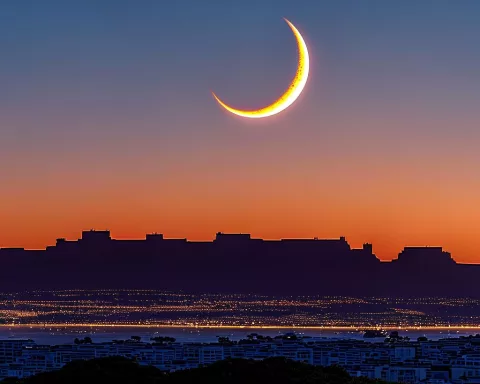Ramadan is a special month for Muslims filled with reflection, community, and self-discipline. From dawn to sunset, they fast, pray more, and help those in need, all leading to the joyful celebration of Eid al-Fitr at the end. As the crescent moon appears, families come together in vibrant gatherings, sharing meals and traditions. This time is not just about abstaining from food; it’s a journey to grow spiritually and strengthen bonds with others. Ultimately, Ramadan inspires gratitude, kindness, and a deeper connection to faith, leaving a lasting impact on everyone involved.
What is the significance of Ramadan for Muslims?
Ramadan is a sacred month for Muslims, focusing on spiritual reflection, community bonding, and discipline. It involves fasting from dawn to sunset, increased prayers, and charitable acts. This period culminates in the celebration of Eid al-Fitr, marking the end of fasting and emphasizing gratitude and unity.
Anticipation and Preparation for Ramadan
As Ramadan approaches, there is a noticeable shift in the atmosphere, marking the onset of a month dedicated to introspection and communal bonds. The streets come alive with bustling activity as food vendors prepare for the evening feasts, creating an ambiance rich with both spiritual devotion and social interaction. For Muslims, Ramadan is not merely about fasting from food and drink; it represents a profound journey toward spiritual cleansing and the strengthening of community ties. This article delves into the multifaceted nature of this sacred month, exploring its practices, significance, and distinct celebratory customs.
The timing of Ramadan, governed by the Islamic lunar calendar, advances by 10 to 12 days each year in the Gregorian calendar. Being the ninth and most sacred month, Ramadan lasts for 29 or 30 days, contingent on the moon’s visibility. Enthusiasts eagerly scan the night sky for the first appearance of the crescent moon, an event deeply rooted in tradition and regional excitement. In particular, the Crescent Observers Society, fondly known as the maankykers, diligently monitor this celestial event, which determines the beginning and conclusion of Ramadan and the subsequent celebration of Eid.
As the 29th day of Ramadan draws to a close, places like Three Anchor Bay in Cape Town become vibrant with gatherings. Families and friends spread out picnic blankets, laden with delicacies for breaking the fast, while eagerly awaiting the announcement of the moon sighting. This cultural spectacle not only blends devotion with community spirit but also emphasizes the social aspect of the festival.
Spiritual Commitment and Community Traditions
Beyond the communal events, Ramadan is characterized by rigorous spiritual discipline. From dawn until dusk, Muslims abstain not only from food and water but also from impure thoughts and actions. This fasting, known as sawm, acts as both a physical and spiritual purification, integral to the Five Pillars of Islam. The pre-dawn meal, suhoor, provides essential sustenance for the day, while iftar, the meal at sunset, traditionally begins with the simplicity of dates and water, in line with the practices of the Prophet Muhammad.
The Cape Malay community enriches Ramadan with unique traditions, such as boeberaand, celebrated midway through the month. During this time, tables are adorned with boeber, a creamy and sweet beverage symbolizing the midpoint of the spiritual journey. These customs add a local flavor to the global Islamic observance, creating a more profound experience for participants.
Nightly prayers, known as Taraweeh, gather worshippers in mosques where the entire Qur’an is recited over the month. The last ten nights are particularly crucial as they invite deeper contemplation and worship, possibly containing Laylatul Qadr, the Night of Power. This night, believed to be when the Qur’an’s first verses were revealed to Prophet Muhammad, carries the blessings of a thousand months.
Flexibility and Charity in Ramadan
Fasting exemptions exist for those unable to participate due to health concerns, age, or conditions such as pregnancy or menstruation. These allowances highlight the flexibility and compassion inherent within the faith, ensuring that the practice remains a positive and meaningful expression of devotion.
Ramadan’s influence extends into the community, fostering a spirit of generosity and charity. Muslims often increase their charitable contributions, emphasizing the month’s focus on altruism and empathy. The sayings of Prophet Muhammad underscore the spiritual rewards of Ramadan, depicting it as a time when the gates of heaven open and negative forces are restrained.
Cultural practices during the month emphasize modesty and self-restraint. Many Muslims adjust their daily routines, from the way they dress to their entertainment choices, seeking to enhance their spiritual engagement. This transformation embodies the essence of Ramadan—a pursuit of personal improvement and a deeper connection to faith.
Celebrating Eid and the Legacy of Ramadan
As Ramadan concludes, the vibrant festival of Eid al-Fitr unfolds, marking the end of fasting with communal prayers and celebrations. Muslims dress in their finest clothes, visit loved ones, and exchange gifts, culminating in bountiful meals that echo the communal gatherings of the past month. This occasion is more than just a celebration of fasting’s end; it signifies the culmination of a month-long spiritual journey.
Later in the year, Eid al-Adha coincides with the Hajj pilgrimage, celebrating the faith and sacrifice of Prophet Ibrahim through the symbolic act of animal sacrifice. This festival serves as a poignant reminder of the demands and rewards of faith.
Ramadan, with its rich blend of spirituality, culture, and community, captivates both observers and onlookers. The month stands as a testament to the enduring power of faith to unite people, transcend everyday challenges, and inspire profound personal growth. Through its fasting, festivities, and fervor, Ramadan enriches the lives of Muslims worldwide, offering a blueprint for reflection and renewal that resonates far beyond its lunar boundaries.
FAQ: The Spirit of Ramadan
What is the significance of Ramadan for Muslims?
Ramadan is a sacred month dedicated to spiritual reflection, community bonding, and self-discipline. It involves fasting from dawn until sunset, increased prayers, and acts of charity. This period culminates in the celebration of Eid al-Fitr, marking the end of fasting and emphasizing themes of gratitude and unity.
How is Ramadan observed on a daily basis?
During Ramadan, Muslims fast from dawn (Fajr) until sunset (Maghrib), abstaining from all food and drink. The day begins with a pre-dawn meal called suhoor and ends with iftar, the meal to break the fast, traditionally starting with dates and water. Throughout the day, there is a focus on prayer, reading the Qur’an, and engaging in charitable acts.
What are some unique traditions associated with Ramadan?
Different communities bring their own unique customs to Ramadan. For example, the Cape Malay community celebrates boeberaand, where people enjoy boeber, a creamy and sweet beverage symbolizing the midpoint of the month. Nightly prayers (Taraweeh) are also significant, where congregations gather to recite the Qur’an throughout the month.
What is the importance of Eid al-Fitr?
Eid al-Fitr is a festival that marks the end of Ramadan. It involves communal prayers, dressing in fine clothes, and sharing meals with family and friends. The celebration signifies the culmination of a month-long spiritual journey and reinforces community ties as well as gratitude for the blessings received during Ramadan.
Are there exemptions to fasting during Ramadan?
Yes, there are exemptions for those who are unable to fast due to health concerns, age, or conditions such as pregnancy or menstruation. These allowances reflect the compassion and flexibility inherent in the faith, ensuring that Ramadan remains a meaningful and positive experience for all participants.
How does Ramadan foster a spirit of charity?
Ramadan emphasizes generosity and charitable contributions, with many Muslims increasing their acts of charity during this time. The month serves as a reminder of empathy and altruism, inspired by the teachings of Prophet Muhammad, which highlight the spiritual rewards of giving, especially during this sacred period.












